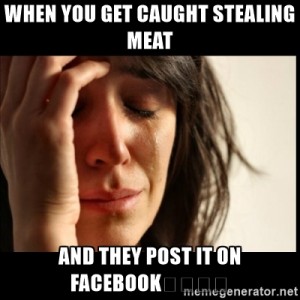Following word of growing meat thefts in Melbourne, Stuff.com reports nearly $10,000 worth of meat was stolen from grocery and specialty food stores in Auckland in April with tactics ranging from lamb legs stuffed down trousers to coordinated gang thefts with getaway vehicles.
 Statistics from crime prevention company Auror showed meat was the most stolen grocery item of the stores they monitored with at least 20 thefts of more than $200 worth of meat.
Statistics from crime prevention company Auror showed meat was the most stolen grocery item of the stores they monitored with at least 20 thefts of more than $200 worth of meat.
Auror chief executive Phil Thomson said the company had become aware meat was being stolen in large quantities then sold online through social media.
“We’ve even seen reports where items like bacon have been used as currency by criminals to barter.”
In an attempted theft on April 15 a particularly persistent offender tried to nab $300 worth of lamb legs, chicken kebabs and other assorted meats over the course of three visits to an Auckland grocery store – all in one day.
Auror’s incident report said the first time the man entered the store, he picked up two legs of lamb before heading to the next aisle and attempted to stuff them down his trousers.
When both lamb legs fell out of his trouser legs he ditched one on the ground, and continued on his way through the supermarket whilst executing a second attempt to hide the second lamb leg down his pants.
“The duty manager saw the lamb on the floor, picked it it up and saw the offender, and approached him as she saw the other leg of lamb still attempting to be put down trousers,” the report read.
The offender left without complaint, but apparently wasn’t deterred.
 He returned twice the very same day. The second time he attempted to steal chicken kebabs with a side of batteries and the third time, expanding his horizons, with a basket filled with assorted meats.
He returned twice the very same day. The second time he attempted to steal chicken kebabs with a side of batteries and the third time, expanding his horizons, with a basket filled with assorted meats.
In a separate incident on April 26 two woman attempted to ram their way out of a central Auckland supermarket with a full trolley of meat worth $840.
A Ministry of Primary Industries (MPI) spokesman said MPI anyone selling meat to the public needed to be registered for sale.
“Consumers buying from an unregistered or black market source have no guarantee that correct food safety measures have been taken with storing or handling the product.”
